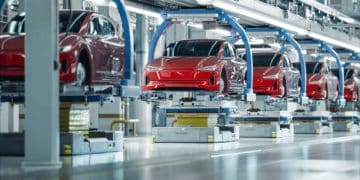by supplychainreport
In response to ongoing trade challenges, a leading automaker has launched a dedicated task force aimed at minimizing the financial impact of U.S. tariffs. The company is strategically shifting production of certain vehicle models from Mexico to the United States to maintain its competitive edge in the U.S. market.
The move comes as the automotive industry faces significant exposure to U.S. tariffs, with a 25% tariff on automobiles and auto parts threatening to drive up vehicle prices and potentially affect sales. This is especially critical for manufacturers that generate a significant portion of their global sales from the U.S. market.
The task force will focus on increasing local sourcing of car components in the U.S. to minimize disruptions to production and reduce reliance on imports. These efforts are part of a broader strategy to adapt to the evolving trade environment, which also includes a large-scale investment in U.S. manufacturing capabilities. However, increasing domestic output will take time, and the company is carefully navigating these tariff-induced challenges.
In addition to shifting production, the automaker has frontloaded shipments to the U.S., leading to higher inventory levels. Despite these adjustments, the company remains optimistic, forecasting moderate revenue growth and aiming for a steady operating profit margin.
Looking ahead, the company is exploring potential collaborations in the electric vehicle segment, signaling a forward-looking strategy to address evolving trade dynamics. These efforts highlight the importance of flexibility and strategic planning in maintaining supply chain stability amidst shifting trade policies.
As the tariff landscape continues to evolve, the company’s proactive measures offer a blueprint for other manufacturers facing similar challenges, underscoring the need for adaptability in the face of uncertain trade conditions.
#BreakingNews #SupplyChainReport #TariffsImpact #StrategicAdjustments #TradeChallenges















